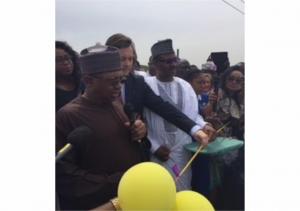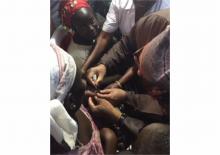Routine immunization in Nigeria gets a bolster from the European Union
Abuja 27 October 2017: As part of the ongoing efforts to revamp routine immunization in Nigeria, the European Union (EU) on the 27th of October commissioned equipment, vehicles and solar refrigerators to support routine immunization activities in 23 states and the FCT.
The works and supplies project which was commissioned by the Minister of Health Professor Isaac Adewole represented by the Minister of State for Health Dr Osagie Ehanire traced the history of European Union support to Nigeria to 2002 when Nigeria implemented the first project that lasted through to 2011. Prof Adewole while reaffirming government commitment to reducing the infant / child morbidity and mortality rates in the country, disclosed that the equipment and vehicle supplies provided by the government of the EU through EU SIGN project in Nigeria will go a long way in assisting Nigeria to meet Sustainable Development Goals.
While appreciating the EU for implementing various innovative projects ideas in Nigeria, Prof Adewole revealed that government will emulate EU patient-centered model in providing routine immunization to Nigerians. “We will continue to collaborate with the EU for more of similar projects in providing services for our people” the Minister said.
Earlier in his speech at the occasion, EU Ambassador to Nigeria Mr Ketil Karlsen disclosed that the European Union Support to Immunization Governance in Nigeria (EU-SIGN) is a follow up Project to the Partnership to Reinforce Immunization Efficiency (EU-PRIME) Project with EUR 97.4m and the Support to Routine Immunization in Kano (SRIK) Project, with EUR 15.46 million, both of which were implemented from 2002 – 2011.“EU SIGN project is expected to support Nigeria to reduce the burden of vaccines preventable diseases interrupt the spread of polio and enhance the local capacity” according to Mr Karlsen.
Speaking on behalf of development partners Dr Rex Mpazanje who represented the World Health Organization (WHO) Country Representative Dr Wondimagegnehu Alemu commended the EU for being a long standing global partner to WHO globally and locally; especially in the area of polio eradication. In a recent global effort to shore up more resources to eradicate polio, the EU pledged the sum of fifty five million euros (€55m), that is sixty one million US dollars ($61.4 million) towards the eradication of poliovirus globally Dr Alemu disclosed.
As part of its commitment to global public health, the EU in Nigeria has provided funding to strengthen health systems and polio eradication. “In particular in 2017, the EU provided 20 million euros (€20m) to strengthen health systems by building the capacity for data analysis and estimation of health expenditure patterns; and support for integrated efforts to eradicate polio with a focus on reaching all eligible children with drops of OPV in the priority areas” WHO country Representative said.
Receiving the items on behalf of the federal and state governments, Dr Faisal Shuaib the Executive Director of the National Primary Healthcare Development Agency (NPHCDA) reemphasised the strategic priorities of NPHCDA which include strengthening governance and accountability, closing out polio, PHC revitalisation and improving routine immunisation. “So far the EU SIGN project has aligned its support around the transformational initiatives of NPHCDA” Dr Faisal disclosed.
Major highlights of the events were the commissioning of Direct Drive Solar Refrigerators for 757 PHC facilities for 506 LGAs; twenty nine 4-WD Vehicles to support distribution of vaccines and other health commodities; 134 computers and printers for the beneficiary states and administration of oral polio vaccine by the Minister of Health, EU Ambassador, NPHCDA ED, Acting WR Dr Rex Mpazanje and other important dignitaries.

